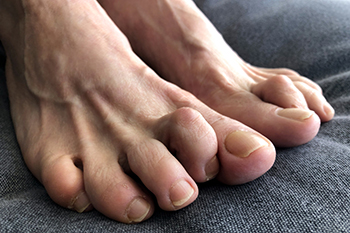
A hammertoe is a deformity where the middle of a toe joint is bent and the end of the toe angles down resembling a claw. It usually involves the second toe but also can involve other toes. A corn often develops on the top of the toe and a callus on the sole of the foot. Over time, one cannot straighten the toe and walking can become painful. Causes of hammertoe are wearing narrow, short shoes that force the second toe to bend forward or a congenital defect that develops over time. The muscles and tendons in the toe tighten and become shorter. Those who wear high heels or shoes that do not fit properly are more apt to suffer from this condition. Wearing properly fitting footwear that does not put the foot at an angle, with soft insoles to relieve pressure on the toes, can help prevent hammertoe. Since a hammertoe can become painful and interfere with normal functioning, seeing a podiatrist for proper diagnosis and treatment is suggested. Sometimes surgery to straighten the joint will be necessary.
Hammertoe
Hammertoes can be a painful condition to live with. For more information, contact one of our podiatrists from Princeton Foot and Ankle Associates. Our doctors will answer any of your foot- and ankle-related questions.
Hammertoe is a foot deformity that affects the joints of the second, third, fourth, or fifth toes of your feet. It is a painful foot condition in which these toes curl and arch up, which can often lead to pain when wearing footwear.
Symptoms
- Pain in the affected toes
- Development of corns or calluses due to friction
- Inflammation
- Redness
- Contracture of the toes
Causes
Genetics – People who are genetically predisposed to hammertoe are often more susceptible
Arthritis – Because arthritis affects the joints in your toes, further deformities stemming from arthritis can occur
Trauma – Direct trauma to the toes could potentially lead to hammertoe
Ill-fitting shoes – Undue pressure on the front of the toes from ill-fitting shoes can potentially lead to the development of hammertoe
Treatment
Orthotics – Custom made inserts can be used to help relieve pressure placed on the toes and therefore relieve some of the pain associated with it
Medications – Oral medications such as anti-inflammatories or NSAIDs could be used to treat the pain and inflammation hammertoes causes. Injections of corticosteroids are also sometimes used
Surgery – In more severe cases where the hammertoes have become more rigid, foot surgery is a potential option
If you have any questions please contact our offices located in Princeton, and West Windsor, NJ . We offer the newest diagnostic and treatment technologies for all your foot and ankle needs.
